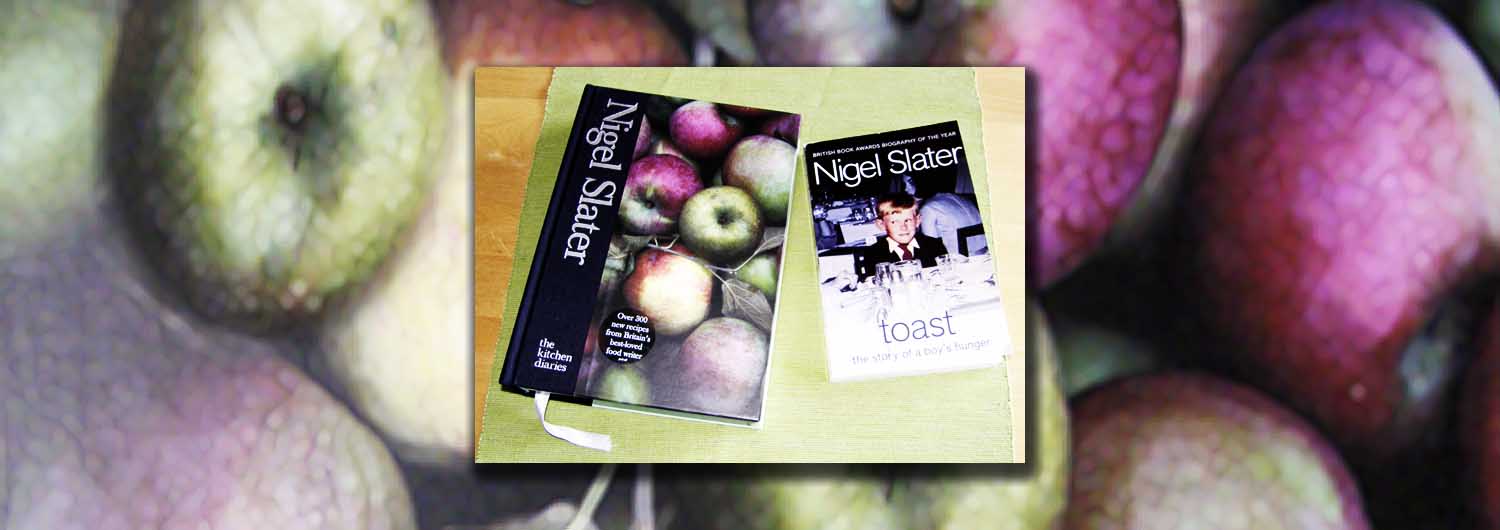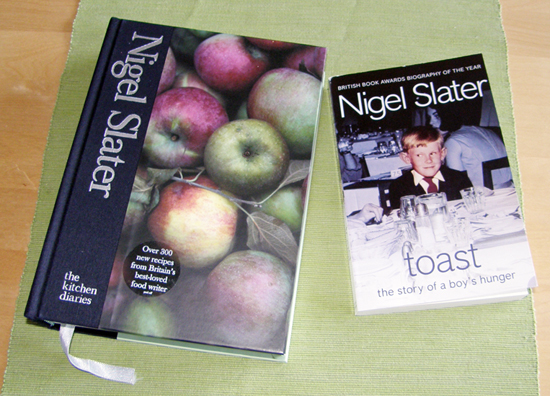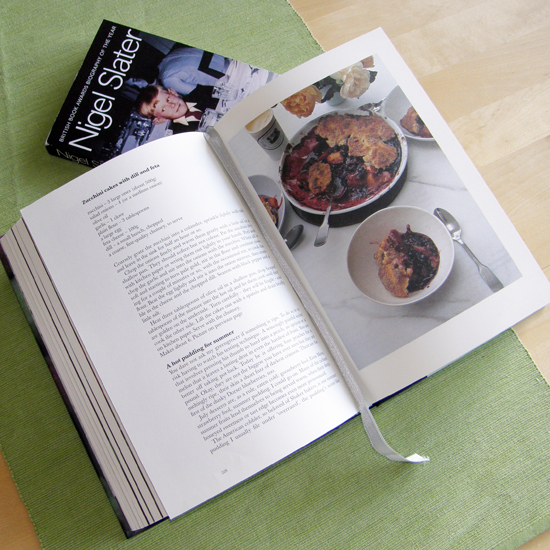I am reading my birthday presents, two books by Nigel Slater. A big, fat, beautifully illustrated hardback called The Kitchen Diaries and a slim paperback called Toast. The former is about seasonal foods in a combination of diary entries and recipes. The latter a biographical sketch of the author’s childhood in the 60s told by reference to his memories of food.
Both books are wonderful and inspirational, in terms of the foods they discuss and in terms of the writing style.
Stories of hunger
The Kitchen Diaries describe meals Nigel Slater makes with fresh vegetables or fruit from his own garden or with (mostly) locally produced fresh ingredients bought at shops and markets near where he lives. The food is seasonal. That means I have a hope of emulating some of the recipes here in Sweden. If I allow for the spring-time lag and the autumn acceleration. Slater seems to live in the south of England – London – so especially his spring and autumn are longer, more drawn out. Gothenburg lies on the same parallel as Aberdeen, but tends to have more continental-style winters: longer and colder.
Toast (sub-title: The story of a boy’s hunger) is broken into short, evocative chapters. Mostly these have titles like “Christmas Cake”, “Rice Pudding”, “Butterscotch Flavour Angel Delight”. Occasionally there is a title that is not the name of a food. “The Lunch Box” is about Josh the gardener. “Percy Salt” turns out to be the name of the grocer’s where Nigel’s mother does her shopping. Each chapter encapsulates a food-related memory and opens a glimpse into a boy’s childhood in the 1960s, which bears close comparison to my own childhood memories also from the 60s. Very satisfying.
I am so captivated by these books that I have to read sections of them aloud over the dinner table. We are eating a spaghetti carbonara with a typically Swedish salad of grated carrot and thinly sliced summer cabbage. I have enlivened it with rounds of a red spring onion and a simple vinaigrette dressing. (Nigel Slater: His influence!) So I read Slater’s account of his family’s first and only attempt to make spaghetti bolognese. This sets us off remembering.
Kitchen memories
I too remember the long blue packets of spaghetti, “for all the world like a great long firework”. The way the strands, dumped into a pan of boiling water “splay out like one of those fibre-optic lights”. But my Mum had had an Italian boyfriend before she married Dad. She knew how to cook spaghetti, and to make a bolognese sauce that didn’t come from a can. Like Slater’s family, though, we also had powdered parmesan shaken from a cardboard drum. I also remember thinking “this cheese smells like sick”.
Mrs SC’s memories of spaghetti in tomato sauce are all from her bamba (barnbespisning = school dinner hall).
We put away a bottle of red wine between us. (This is still the lag of celebrating my birthday.) And I think how much fun we’re having with these memories. How easy it would be to emulate Nigel Slater and write a book about Swedish food as a memory trigger. About how it would be popular on both sides of the North Sea.
Ha!
The following morning, sitting here at my keyboard, I can’t remember clearly a single anecdote or incident. Curse that red, red wine!




Haha, sounds like you had a really nice time and really enjoy your birthday presents!
Those presents really sound and look inspirational! Food, the experience of cooking it and later the ceremony of eating it, seems to be one of those universal things that brings people together. Perhaps not surprising that Nigel has managed to captivate you and brings out those childhood memories.
Thanks for your comments, Aleks and Kristina. I am indeed enjoying the presents.
I agree with your thought Aleks. Another reason Nigel Slater’s autobiog resonates, I think, is that, like smells, tastes can evoke very specific and often very early memories. (Even, it would seem, when the taste itself is all in the mind and you are relying on written description.)
And I agree with what you write, that smells and tastes can evoke very specific and often early memories. Things that happen to us before the age of three are seldom remembered cognitively. On the other hand we form millions of memories through our bodies/senses before the age of three, just like you wrote, and even as early as in the womb!
My earliest memory I can date approximately to when I was between 2 and 3 years old. We lived in Qatar where my father was working as an engineer for BP.
In the memory I am standing with him to watch tanker trucks being driven on to or off of a transporter ship. The colours are vivid – yellow for the sand, blue for the sky and a darker blue strip for the sea. The ship is white and the tankers are white, green and yellow.
It is a memory not a remembered photograph or a dream. And it must have taken place no later than January 1961, because my mother flew with me home to England then in order to give birth to my sister in February. We were not abroad again till I was 6, when we went to Ghana.
I have several other snatches of memories from when I was 3, 4 and 5 but my earliest long, continuous memories date from the 9 months or so we spent in Ghana.